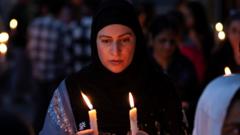Shabir Ahmad Dar, a Kashmiri pashmina shawl seller in Mussoorie, has dedicated over two decades to his craft, but recent events have turned his identity from a point of pride to one of peril. Following a brutal attack that left 26 civilians dead in a tourist area of Kashmir, Dar and another seller fell victim to a harrowing assault by a right-wing group incensed by the incident, marking a troubling rise in violence directed toward Kashmiris in India.
In a video capturing the assault, Dar and his colleague are seen being verbally abused and physically attacked, with their goods being destroyed as bystanders looked on in silence. "They blamed us for the attack, told us to leave town and never show our faces again," Dar remarked. He currently feels too terrified to return for his goods, which hold significant monetary value, but even more so, they represent his cultural heritage.
The fallout of the Pahalgam attacks catalyzed a wave of hostility directed at Kashmiri vendors and students across various Indian cities. Reports emerged of classmates and drivers confronting Kashmiri individuals with accusations and hostility. Amidst the chaos, a naval officer’s widow called for peace, emphasizing the importance of not directing anger toward innocent individuals. Still, many Kashmiri natives have sought refuge in their homeland, with safety concerns overshadowing their lives.
In the wake of the militant attack, security forces heightened their presence across the region, detaining thousands and demolishing homes linked to suspected militants. Critics decry these measures as collective punishment, eroding the lives of innocent civilians who already face the stigma of suspicion. Politicians in the region, including Chief Minister Omar Abdullah, have called for accountability while urging the government to protect innocent lives.
Meanwhile, the climate of fear weighs heavily on Kashmiris. Ummat Shabir, a student, recounted how she faced accusations of terrorism from locals, while another Kashmir native expressed his frustration at being continuously seen as a potential suspect despite the diminishing militancy in recent years.
Shafi Subhan, a shawl seller from Kupwara, highlighted the unique bond he once enjoyed with Mussoorie's residents, emphasizing the emotional toll of the recent attack and the ensuing violence. "No one came to help during our attack," he lamented, feeling a profound loss not just of safety but of community.
Kashmir, a region embroiled in turmoil due to its contentious relationship between India and Pakistan, faces moments of escalated tensions that disproportionately affect its civilians. Public gatherings expressing grief over the recent attacks highlight the complexity of emotions experienced by Kashmiris who feel chained by an identity that offers them no refuge from violence or suspicion.
As the search for the attackers continues, the stories of everyday Kashmiris, like Mohammad Shafi Dar—a daily wage worker living under the open sky due to recent violence—underscore the devastating impact of these geopolitical struggles on human lives. "We lost everything," he shared. Without answers or security to offer, the plight of Kashmiris remains a critical flashpoint in India's ongoing narrative.




















